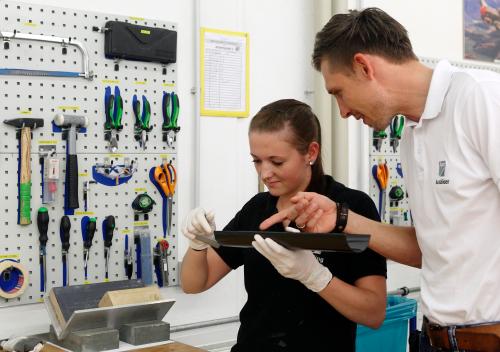President Donald Trump made the saying “You’re fired!” ubiquitous during his television show “The Apprentice.” This week the President is singing a decidedly different tune as he looks to announce an expansion of German-inspired apprenticeship programs as the crux of his not-yet-formulated labor policy. With that in mind, we revisit here some of the best workforce and apprenticeship content from the Brookings Metropolitan Policy Program.
Will Trump be the one to take apprenticeships to scale?
By Susan Helper
April 7, 2017
Leading off with a poignant and timely take is Brookings nonresident senior fellow Susan Helper, who asks the question: can President Trump be the person to take apprenticeships to scale? Helper, noting that the president has expressed his support for the German apprenticeship model, examines the ‘registered apprenticeship approach,’ and finds the benefits of apprenticeships amount to a potential win-win-win for companies, workers, and communities.
 Here’s what American universities can learn from Germany
Here’s what American universities can learn from Germany
By Joseph Parilla and Martha Ross
July 27, 2016
Along similar lines, Joseph Parilla and Martha Ross opine in the Washington Post that with education and skills as the currency for workplace success in our advanced economy, the United States should look to places such as Germany to “inspire new ways to align government, business, and educational institutions to prepare young people for economic success.” Two ways to do that: 1) building stronger bridges between employers and educators, and 2) matching our commitment to make education accessible with a commitment to help students complete their studies and earn meaningful credentials and degrees.
 Launching a regional apprenticeship program: A Q&A with Amy Cell of the Michigan Economic Development Corporation
Launching a regional apprenticeship program: A Q&A with Amy Cell of the Michigan Economic Development Corporation
By Joseph Parilla and Alan Berube
March 16, 2015
Moving from the conceptual to the programmatic, in this piece Brookings’ Joseph Parilla and Alan Berube are joined by Amy Cell, senior vice president of talent enhancement at the Michigan Economic Development Corporation (MEDC), to discuss the evolution of Michigan’s Advanced Technician Training (MAT2) apprenticeship program and the lessons she has learned since its inception, and to cast a collectively discerning eye towards future success, replication, and scale.
 Building one of America’s fastest-growing apprenticeship programs: A Q&A with Brad Neese of Apprenticeship Carolina
Building one of America’s fastest-growing apprenticeship programs: A Q&A with Brad Neese of Apprenticeship Carolina
By Alan Berube and Joseph Parilla
April 7, 2015
In this additional Q&A, Berube and Parilla interview Brad Neese, director of Apprenticeship Carolina, one of the largest and fastest-growing apprenticeship programs in the country. “To us, success means that we are meeting the needs of our employers while providing South Carolinians with the pathways that lead to good careers,” Neese notes.
 Skills and innovation strategies to strengthen manufacturing: Lessons from Germany
Skills and innovation strategies to strengthen manufacturing: Lessons from Germany
By Alan Berube, Joseph Parilla, and Jesus Leal Trujillo
February 26, 2015
Both MAT2 and Apprenticeship Carolina are featured in this compendium of best practices and lessons learned from Germany’s dual training system, authored by Alan Berube, Joseph Parilla, and Jesus Leal Trujillo. After traveling to Munich and Nuremberg as part of the Global Cities Initiative, the authors conclude that, “three elements of success—regional collaboration between public, private, and civic actors; targeted institutional intermediaries that address market and coordination failures; and incentive-based investments to support SMEs—should guide U.S. practitioners and policymakers seeking to adapt German skills best practices to support manufacturing here at home.”
 The skills supply chain must change as software eats the world
The skills supply chain must change as software eats the world
By Mark Muro
June 2, 2016
Local and state apprenticeships efforts are responding to significant technology-related shifts in the demand side of the labor market. In this piece, senior fellow Mark Muro checks in from Flint, MI in the latest advanced industries regional workshop convened at Kettering University, one of the nation’s earliest bastions of highly applied, experiential engineering education. Enthused by the energy of two dozen industry executives, entrepreneurs, educators, training-system officials, and economic development people, Muro reports on his five biggest takeaways from the day’s events to help prepare workers for the changing technological demands of work.
 Employment by race and place: snapshots of America
Employment by race and place: snapshots of America
By Martha Ross and Natalie Holmes
February 27, 2016
The changing skills demands of employers are occurring amidst significant disparities in employment by race and place in America. That was the takeaway from a report by Martha Ross and Natalie Holmes that analyzed employment by race for cities and counties with populations over 500,000. They conclude that strategies must differ locally based on the varied challenges of America’s distinct regional labor markets. Weak labor markets need to build on their assets such as educational institutions, industry clusters, and civic leadership to boost their overall productivity and growth. And all places need to develop and invest in strategies to ensure that no community is systematically left behind.
 Help wanted: Better pathways into the labor market
Help wanted: Better pathways into the labor market
By Martha Ross
June 7, 2016
Martha Ross explores the myriad strategies that local and regional leaders can use to build more structured pathways to employment, especially for young adults and persons of color. “In order to produce better employment outcomes at scale,” Ross says, “leaders from all sectors and levels of government need to make broader shifts in how education and workforce programs are designed, and how they interact with each other and employers. That is a heavy lift, but it is worth it to address the high costs imposed by the status quo: high unemployment, poverty, and untapped potential.”
The Brookings Institution is committed to quality, independence, and impact.
We are supported by a diverse array of funders. In line with our values and policies, each Brookings publication represents the sole views of its author(s).








Commentary
You’re Hired?
June 15, 2017